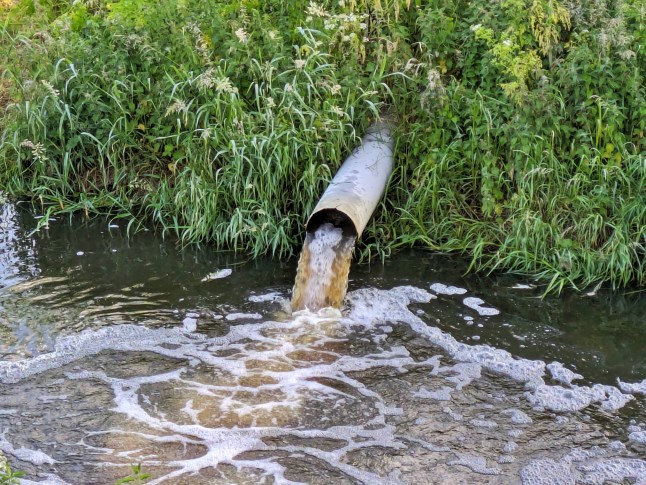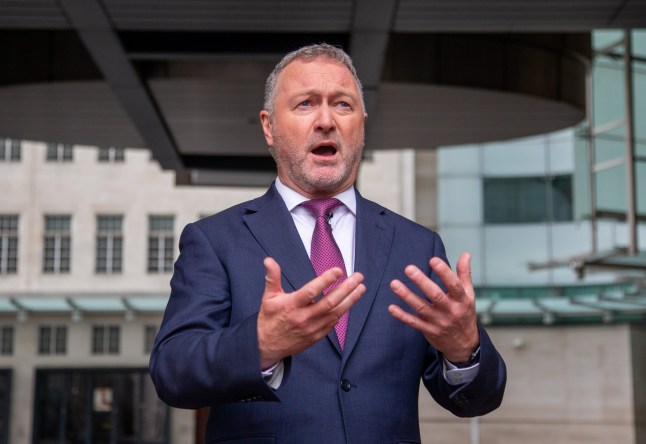Five key takeaways from landmark report into UK’s ‘broken’ water industry


A major 465-page report has called for dramatic reform of the beleagured water sector in England and Wales and the wholesale scrapping of its regulator.
The Independent Water Commission, pulled together by ex-banker Sir Jon Cunliffe, sets out 88 recommendations to get the industry back on its feet after years of controversy over bills and sewage.
But campaigners including one-time Undertones frontman Feargal Sharkey have said they are sceptical of whether the report can make a difference.
Sir Jon’s report covers a wide range of topics including infrastructure, water company governance, impact on consumers, and the environment.
He writes: ‘Throughout my career, I have encountered many complex and important public policy issues but securing the future for water has, perhaps, been the most important of them all.
Sign up for all of the latest stories
Start your day informed with Metro’s News Updates newsletter or get Breaking News alerts the moment it happens.
‘While it will not happen overnight, I am convinced that if the major changes recommended in this report are adopted and pursued with sustained commitment, we can restore trust and have a future for water that is desired on all sides.’
End of the road for Ofwat
In a speech following the publication of the report today, Environment Secretary Steve Reed confirmed the big news everyone was expecting: Ofwat, the regulator which has overseen the water sector in England and Wales since 1989, will be abolished.
Sir Jon suggests in his report that Ofwat in England should be combined with the Drinking Water Inspectorate and the water environment sections of the Environment Agency and Natural England to form a new body.
In Wales, he proposes embedding the regulator within Natural Resources Wales.
A spokesperson for Ofwat said they have been ‘working hard to address problems in the water sector in recent years’, but the publication of the report ‘marks an opportunity to reset the sector’.
They added: ‘Ofwat will now work with the government and the other regulators to form this new regulatory body in England and to contribute to discussions on the options for Wales set out in the report.’
Scotland and Northern Ireland both have nationalised water systems.
National social tariff scheme
On Sunday, Steve Reed told broadcasters water bills will be increasing for a while no matter what reforms are put in place.
He said households should expect to see a ‘small and steady’ rise in the cost of their water – but in his report, Sir Jon predicts bills are going to increase ‘markedly over the next five years’.
In an interview with BBC Breakfast this morning, he put that anticipated rise at 30 percent by 2030.
This is the result of a ‘huge step up of investment in the water sector’, he writes, which will need to remain high into the future to meet challenges including climate change and population growth.
Water companies across the country use social tariffs to reduce the cost for people who might struggle to afford their bills.
With Ofwat likely heading for the big regulator network in the sky, Sir Jon proposes a national scheme for social tariffs to simplify the system.
Report contains bad news about bills, writes Craig Munro
Metro‘s Senior Political Reporter Craig Munro reacts to the Cunliffe report:
Sir Jon Cunliffe’s report is packed with recommendations about how the dismal water sector in England and Wales might be set on a better path.
There are 88 of them, and I’d argue most are pretty impenetrable to the average water customer with a lot of technical jargon.
But all those tweaks could add up to a very different landscape in the next few years.
For many people, all this will boil down to one simple question: what does it mean for my bills?
I’m afraid the answer is not what people might be hoping for.
Hidden in the report is an estimate from Ofwat for how much bills may have to rise to pay for all the investment needed to meet those challenges mentioned in the story above.
The regulator said they could reach £2,000 a year by 2050 – up from an average of around £470 per year in England at the moment. You don’t need me to tell you that’s an extreme hike, more than 400 percent.
‘Against that background, it is crucial that there is effective support for those who will face water poverty and struggle to meet their bills,’ the report says.
This could be a real headache in the making for the government.
Dialling up smart meters
Smart meters are becoming a part of everyday life for many households across the country, for utilities including electricity and gas.
Sir Jon points out these can be used to ‘accelerate efforts to reduce household water consumption’ – a key aim of the Commission’s efforts.
The public has a ‘poor understanding of their current level of water usage’, which could end up increasing pressure on resources from the growing population and prolonged dry weather like we’ve seen in recent weeks.
Both the UK and Welsh governments should explore the introduction of support schemes to help broaden the use of smart meters, the report recommends.
How are campaigners reacting to the report?
River Action heavily criticised Sir Jon Cunliffe’s report shortly after its publication this morning.
CEO James Wallace said, “This was a once-in-a-generation opportunity to reset a broken and corrupted system. Instead, the Commission blinked.
‘After three decades of privatisation, there is no evidence it can work. The report diagnoses symptoms but avoids the cure, appeasing the vulture capital markets and failing to propose alternative public-benefit investment, ownership and governance models that have been proven across Europe.
“We needed a credible plan to rescue Britain’s rivers, lakes, and seas – and a clear pathway to bring failing companies like Thames Water into public control. Instead, we’ve been handed vague policy nudges that leave the current failed privatised water company model intact.
‘When raw sewage is pouring into our waterways and reservoirs run dry, tinkering with regulatory half-measures simply isn’t enough to restore public trust.’
Environment Secretary puts job on the line
Steve Reed, the Environment Secretary, promised yesterday to halve the sewage pollution in British rivers, lakes and seas by the end of this decade, and make them the cleanest since records began.
In an appearance on Laura Kuenssberg’s BBC show, he said he would step down from his role if he failed to achieve this target.

Reed, who saw the report first on Saturday, said: ‘Politicians come and say we’re going to do things. Of course our job should be on the line if we don’t.’
He is set to describe the water industry as ‘broken’ and welcome the recommendations of the report when they drop later today.
New ombudsman on the way
Ahead of the report’s launch this morning, the UK government announced the creation of a new water ombudsman.
This will provide a ‘single, free point of contact’ for customers who are in disputes with their water company, the Department for Environment, Food and Rural Affairs said.
Reed said: ‘Today’s final report from Sir Jon Cunliffe’s Independent Water Commission offers solutions to fix our broken regulatory system so the failures of the past can never happen again.
‘The Government will introduce root and branch reform in the biggest overhaul of water regulation in a generation.’
Get in touch with our news team by emailing us at webnews@metro.co.uk.
For more stories like this, check our news page.



